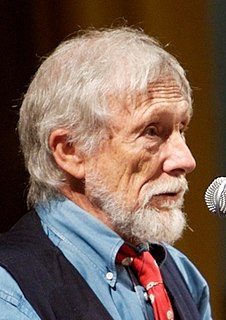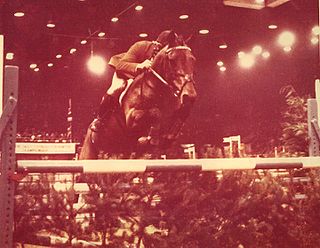Related Research Articles

Gary Snyder is an American man of letters. Perhaps best known as a poet, he is also an essayist, lecturer, and environmental activist with anarchoprimitivist leanings. He has been described as the "poet laureate of Deep Ecology". Snyder is a winner of a Pulitzer Prize for Poetry and the American Book Award. His work, in his various roles, reflects an immersion in both Buddhist spirituality and nature. He has translated literature into English from ancient Chinese and modern Japanese. For many years, Snyder was an academic at the University of California, Davis and for a time served as a member of the California Arts Council.
"The Hound of Heaven" is a 182-line poem written by English poet Francis Thompson (1859–1907). The poem became famous and was the source of much of Thompson's posthumous reputation. The poem was first published in Thompson's first volume of poems in 1893. It was included in the Oxford Book of English Mystical Verse (1917). Thompson's work was praised by G. K. Chesterton, and it was also an influence on J. R. R. Tolkien, who presented a paper on Thompson in 1914.

The Four Horsemen of the Apocalypse are figures in Christian mythology, appearing in the New Testament's final book, Revelation, an apocalypse written by John of Patmos, as well as in the Old Testament's prophetic Book of Zechariah, and in the Book of Ezekiel, where they are named as punishments from God.
This article contains information about the literary events and publications of 1974.

"Ode to a Nightingale" is a poem by John Keats written either in the garden of the Spaniards Inn, Hampstead, London or, according to Keats' friend Charles Armitage Brown, under a plum tree in the garden of Keats' house at Wentworth Place, also in Hampstead. According to Brown, a nightingale had built its nest near the house that he shared with Keats in the spring of 1819. Inspired by the bird's song, Keats composed the poem in one day. It soon became one of his 1819 odes and was first published in Annals of the Fine Arts the following July. The poem is one of the most frequently anthologized in the English language.
The Elder Futhark Odal rune, also known as the Othala rune, represents the o sound. Its reconstructed Proto-Germanic name is *ōþalan "heritage; inheritance, inherited estate".

Joanne Kyger was an American poet. The author of over 30 books of poetry and prose, Kyger was associated with the poets of the San Francisco Renaissance, the Beat Generation, Black Mountain, and the New York School.

Cavalier was first used by Roundheads as a term of abuse for the wealthier royalist supporters of King Charles I and his son Charles II of England during the English Civil War, the Interregnum, and the Restoration. It was later adopted by the Royalists themselves. Although it referred originally to political and social attitudes and behaviour, of which clothing was a very small part, it has subsequently become strongly identified with the fashionable clothing of the court at the time. Prince Rupert, commander of much of Charles I's cavalry, is often considered to be an archetypal Cavalier.

Ichabod Crane is a fictional character and the protagonist in Washington Irving's short story "The Legend of Sleepy Hollow". Crane is portrayed, in the original work and in most adaptations, as a tall, lanky individual with a scarecrow affect. He is the local schoolmaster, and has a strong belief in all things supernatural, including the legend of the headless horseman. Crane eventually begins courting the heiress Katrina Van Tassel, a decision which angers Abraham "Brom Bones" Van Brunt, a local man who also wishes to marry Katrina. After supposedly proposing to Katrina, Crane is headed home alone at night when the headless horseman appears and chases the schoolmaster. Crane is never seen again.

Robert Gould was a significant voice in Restoration poetry in England.

A red herring is something that misleads or distracts from a relevant or important question. It may be either a logical fallacy or a literary device that leads readers or audiences toward a false conclusion. A red herring may be used intentionally, as in mystery fiction or as part of rhetorical strategies, or may be used in argumentation inadvertently.

Zoketsu Norman Fischer is an American poet, writer, and Soto Zen priest, teaching and practicing in the lineage of Shunryu Suzuki. He is a Dharma heir of Sojun Mel Weitsman, from whom he received Dharma transmission in 1988. Fischer served as co-abbot of the San Francisco Zen Center from 1995–2000, after which he founded the Everyday Zen Foundation in 2000, a network of Buddhist practice group and related projects in Canada, the United States and Mexico. Fischer has published more than twenty-five books of poetry and non-fiction, as well as numerous poems, essays and articles in Buddhist magazines and poetry journals.

The Horse of the Year Show - also known as HOYS - was founded to be a culmination of the British equestrian events year. The Show was the idea of Captain Tony Collings and was realised by the then Chairman of BSJA, Mike Ansell. As it was to be the end of Season Finale the show needed to be held indoors, making it a unique event.

The Bronze Horseman: A Petersburg Tale is a narrative poem written by Alexander Pushkin in 1833 about the equestrian statue of Peter the Great in Saint Petersburg and the great flood of 1824. While the poem was written in 1833, it was not published, in its entirety, until after his death as his work was under censorship due to the political nature of his other writings. Widely considered to be Pushkin's most successful narrative poem, The Bronze Horseman has had a lasting impact on Russian literature. The Pushkin critic A. D. P. Briggs praises the poem "as the best in the Russian language, and even the best poem written anywhere in the nineteenth century". It is considered one of the most influential works in Russian literature, and is one of the reasons Pushkin is often called the “founder of modern Russian literature.”
Ronald Frederick Henry Duncan was an English writer, poet and playwright of German descent, now best known for his poem The Horse and for preparing the libretto for Benjamin Britten's opera The Rape of Lucretia, first performed in 1946.
The Five Ranks is a poem consisting of five stanzas describing the stages of realization in the practice of Zen Buddhism. It expresses the interplay of absolute and relative truth and the fundamental non-dualism of Buddhist teaching.

The Vanity of Human Wishes: The Tenth Satire of Juvenal Imitated is a poem by the English author Samuel Johnson. It was written in late 1748 and published in 1749. It was begun and completed while Johnson was busy writing A Dictionary of the English Language and it was the first published work to include Johnson's name on the title page.

The Headless Horseman is a mythical figure who has appeared in folklore around the world since the Middle Ages. The figure is traditionally depicted as a man upon horseback who is missing his head.

BoJack Horseman is an American adult animated tragicomedy sitcom created by Raphael Bob-Waksberg. It stars the voices of Will Arnett, Amy Sedaris, Alison Brie, Paul F. Tompkins, and Aaron Paul. Set primarily in Hollywood, the series tells the story of an anthropomorphic horse named BoJack Horseman (Arnett), the washed-up star of a 1990s sitcom who plans his return to celebrity relevance with an autobiography to be written by ghostwriter Diane Nguyen (Brie). He also has to contend with his agent Princess Carolyn (Sedaris), roommate Todd Chavez (Paul), and former rival Mr. Peanutbutter (Tompkins), as well as his struggles with depression and addiction. The show is designed by cartoonist Lisa Hanawalt, who has been friends with Bob-Waksberg since high school and had previously worked with him on the webcomic Tip Me Over, Pour Me Out.
Ashlee Bond is an American-Israeli show jumping rider who competes for Israel. She has qualified to represent Israel at the 2020 Summer Olympics in Tokyo.
References
- 1 2 Administrator. "The Horse". www.ronaldduncanfoundation.co.uk. Retrieved 2018-09-11.
- ↑ Knowles, Elizabeth (2007-08-23). Oxford Dictionary of Modern Quotations. OUP Oxford. p. 93. ISBN 9780199208951.
- ↑ "History | The Horse of the Year Show". hoys.co.uk. Retrieved 2018-10-11.
- ↑ "Watch HOYS' Ode to the Horse videos - Horse & Hound". Horse & Hound. 2013-07-21. Retrieved 2018-10-11.
- ↑ "Brian Blessed to read Ode to the Horse at HOYS - Horse & Hound". Horse & Hound. 2012-05-31. Retrieved 2018-10-11.
- ↑ "Lucinda Green on the bond that has bound Man to horse - Country Life". Country Life. 2017-09-03. Retrieved 2018-09-11.
- ↑ "'Farewell Spot' Alastair Stewart on the extraordinary bond between man and horse". ITV News. Retrieved 2018-09-11.
- ↑ Palmer, Sue (2016-11-30). Understanding Horse Performance: Brain, Pain or Training?. The Crowood Press. ISBN 9781908809513.
- ↑ Swinney, Nicola Jane (2014-08-21). Horses. Bloomsbury Publishing. ISBN 9781472910837.
- ↑ Price, Steven (2006-10-01). 1001 Best Things Ever Said About Horses. Rowman & Littlefield. ISBN 9781599216683.
- ↑ Hamilton, Allan J. (2011-09-10). Zen Mind, Zen Horse: The Science and Spirituality of Working with Horses. Storey Publishing. ISBN 9781603427807.
- ↑ "History – The Horse of the Year Show" . Retrieved 20 December 2019.
- ↑ Strawson, John (2007-01-01). Hussars, Horses and History. Casemate Publishers. ISBN 9781844155828.
- ↑ "Relay celebrates horses' impact on wellbeing". www.iomtoday.co.im. Retrieved 2021-08-05.